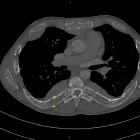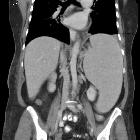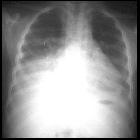extramedullary hematopoiesis

Extramedullary
hematopoiesis of the falx. High signal lesion centered on the falx entering the sulci

Extramedullary
hematopoiesis of the falx. Diffuse and intense high signal of the lesion

Extramedullary
hematopoiesis • Thalassemia with extramedullary hematopoiesis - Ganzer Fall bei Radiopaedia

A focal
extramedullary hematopoiesis of the spleen in a patient with essential thrombocythemia presenting with a complicated postoperative course: a case report. Computed tomography scan of the tumor. A computed tomography scan on admission showed a 70 × 45 mm low-density tumor (a). The tumor exhibited heterogeneous hypo-enhancement during the arterial phase (b arrowheads), and thereafter, the enhancement became gradually homogeneous in the equilibrium phase (c). The tumor was 45 × 30 mm in diameter on a preoperative CT scan 6 months before the surgery (d arrowheads)

Intrathoracic
extramedullary haematopoiesis and skeletal involvement in a case of thalassaemia intermedia. Chest radiograph shows bilateral well-defined opacities overlying the spine (yellow arrows) and right basal peripheral opacity abutting the costal arches (green arrow).

Intrathoracic
extramedullary haematopoiesis and skeletal involvement in a case of thalassaemia intermedia. Chest axial image shows bilateral paravertebral well-marginated soft tissue masses, demonstrating mild enhancement after intravenous injection of contrast medium; diffuse decreased density of bones with structural remodelling is also seen.

Intrathoracic
extramedullary haematopoiesis and skeletal involvement in a case of thalassaemia intermedia. Chest axial image shows bilateral paravertebral well-marginated soft tissue masses and soft tissue in parasternal location (arrow); diffuse decreased density of bones with structural remodelling is also seen.

Intrathoracic
extramedullary haematopoiesis and skeletal involvement in a case of thalassaemia intermedia. Chest axial image shows bilateral paravertebral and right pericostal well-marginated masses, demonstrating mild enhancement after intravenous injection of contrast medium; diffuse decreased density of bones with structural remodelling is also seen.

Intrathoracic
extramedullary haematopoiesis and skeletal involvement in a case of thalassaemia intermedia. Chest axial image shows diffuse structural remodelling of bones with destruction of trabeculae and multiple cortical interruptions; ribs appear widened (arrow).

Intrathoracic
extramedullary haematopoiesis and skeletal involvement in a case of thalassaemia intermedia. Chest axial image shows diffuse structural remodelling of vertebral bodies with trabecular thinning.

Tumor and
tumorlike conditions of the pleura and juxtapleural region: review of imaging findings. Diagnosis: extramedullary hematopoiesis. Technique: chest CT and MRI. Description: A 42-year-old woman with sickle cell anemia was referred for a routine control examination. The axial CT in the mediastinal window setting (a) shows as incidental findings, two well-delineated paravertebral masses with a homogeneous hypodense aspect. There is no locoregional bone invasion. On both the axial T1 vibe MRI sequence with FS (b) and the axial T2 haste MRI sequence (c), the lesions have the same signal intensity as bone marrow. There is no contrast enhancement of the lesions on the axial T1 vibe sequence with FS (d)

Extramedullary
hematopoiesis • Extramedullary hematopoiesis - Ganzer Fall bei Radiopaedia

Extramedullary
hematopoiesis • Peritoneal extramedullary hematopoesis - Ganzer Fall bei Radiopaedia

Extramedullary
hematopoiesis • Extramedullary hematopoiesis - Ganzer Fall bei Radiopaedia

Extramedullary
hematopoiesis • Extramedullary hematopoiesis - thalassemia - Ganzer Fall bei Radiopaedia

Extramedullary
hematopoiesis of the falx. Slightly high signal mass along the falx cerebri

Extramedullary
hematopoiesis • Extramedullary hematopoiesis - Ganzer Fall bei Radiopaedia

Extramedullary
hematopoiesis • Extramedullary hematopoiesis - Ganzer Fall bei Radiopaedia

Extramedullary
hematopoiesis • Extramedullary haemopoiesis - Ganzer Fall bei Radiopaedia

Extramedullary
hematopoiesis • Extramedullary hematopoiesis - adrenal - Ganzer Fall bei Radiopaedia

Extramedullary
hematopoiesis • Extramedullary hematopoiesis - beta-thalassemia major - Ganzer Fall bei Radiopaedia

Primary
myelofibrosis: spectrum of imaging features and disease-related complications. Axial CT of the abdomen demonstrates symmetrical bulky and homogenous low attenuating masses in the adrenal glands (white arrows), consistent with extramedullary haematopoiesis in the adrenal glands. Note also similar attenuation bulky perihilar soft tissue consistent with periportal extramedullary haematopoiesis and splenomegaly (asterisk)

Intrathoracic
extramedullary haematopoiesis and skeletal involvement in a case of thalassaemia intermedia. Chest CT sagittal image shows multiple cortical interruptions of the sternum (arrows), which appears surrounded by soft tissue.

Extramedullary
hematopoiesis • Extramedullary hematopoiesis - Ganzer Fall bei Radiopaedia

Extramedullary
hematopoiesis • Thoracic extramedullary hematopoiesis - Ganzer Fall bei Radiopaedia

An
interesting diagnosis for a presacral mass: case report. CT transverse view of lesion showing 33.52 mm diameter lesion in the presacral area.

Extramedullary
hematopoiesis • Paraspinal extramedullary haematopoesis - Ganzer Fall bei Radiopaedia

Extramedullary
hematopoiesis • Extramedullary hematopoiesis - spleen - Ganzer Fall bei Radiopaedia

Extramedullary
hematopoiesis • Extramedullary hematopoiesis - presacral mass - Ganzer Fall bei Radiopaedia

Extramedullary
hematopoiesis • Extramedullary hematopoiesis - presacral mass - Ganzer Fall bei Radiopaedia

Extramedullary
hematopoiesis • Extramedullary hematopoiesis - spinal epidural lesions - Ganzer Fall bei Radiopaedia

Extramedullary
hematopoiesis • Extramedullary hematopoiesis - presacral soft tissue mass - Ganzer Fall bei Radiopaedia

Extramedullary
hematopoiesis • Adrenal extramedullary hematopoiesis - Ganzer Fall bei Radiopaedia

Extramedullary
hematopoiesis • Extramedullary hematopoiesis - pelvic masses - Ganzer Fall bei Radiopaedia

An
interesting diagnosis for a presacral mass: case report. MRI Sagittal view of lesion.

Extramedullary
hematopoiesis • Thalassemia - Ganzer Fall bei Radiopaedia

An
interesting diagnosis for a presacral mass: case report. CT guided biopsy through presacral lesion using posterolateral approach.

Primary
myelofibrosis: spectrum of imaging features and disease-related complications. Coronal CT of the chest demonstrating extramedullary haematopoiesis in the posterior mediastinum, which typically appear as bilateral and symmetrical posterior mediastinal masses (white arrows)

Primary
myelofibrosis: spectrum of imaging features and disease-related complications. Axial CT of the chest demonstrating extramedullary haematopoiesis in the posterior mediastinum, which typically appear as bilateral and symmetrical posterior mediastinal masses (white arrows). In the paravertebral regions, the soft tissue may compress the exiting nerves in the neural exit foramina or enter the vertebral canal, causing cord displacement or compression

Primary
myelofibrosis: spectrum of imaging features and disease-related complications. Axial CT of the chest in another patient with myelofibrosis demonstrating soft tissue masses in the left and right intercostal spaces (asterisk), proven extramedullary haematopoiesis on histology. Note the bilateral bulky posterior mediastinal masses, also extramedullary haematopoiesis (white arrows)

Primary
myelofibrosis: spectrum of imaging features and disease-related complications. Axial CT demonstrating potential sites of extramedullary haematopoiesis (EMH) in the body. The commonest sites of involvement are the liver and spleen which manifest as hepatosplenomegaly. Less commonly, EMH may present in the periportal region (white arrows) and may be indistinguishable from periportal oedema. Clues to differentiating periportal EMH from periportal oedema include a more lobular appearance to EMH and soft tissue attenuation, whereas periportal oedema is generally less lobular and may have fluid attenuation

Primary
myelofibrosis: spectrum of imaging features and disease-related complications. Coronal CT demonstrating bilateral lobular perirenal soft tissue masses, contained by Gerota’s fascia and not causing contour deformity against the kidneys (white arrows), consistent with perirenal extramedullary haematopoiesis, a common site of extramedullary haematopoiesis in the abdomen. Note also the presence of periportal extramedullary haematopoiesis (black arrow) and splenomegaly (asterisk) in addition to osteosclerosis

Primary
myelofibrosis: spectrum of imaging features and disease-related complications. Axial CT demonstrating bilateral lobular perirenal soft tissue masses, contained by Gerota’s fascia and often not causing contour deformity against the kidneys (white arrows), consistent with perirenal extramedullary haematopoiesis, a common site of extramedullary haematopoiesis in the abdomen

Primary
myelofibrosis: spectrum of imaging features and disease-related complications. T2-weighted MRI demonstrating bilateral posterior mediastinal masses (white arrows) consistent with extramedullary haematopoiesis. The soft tissue has intruded the right neural exit foramen and into the vertebral canal, causing effacement and mild displacement of the thoracic cord (black arrow)

Primary
myelofibrosis: spectrum of imaging features and disease-related complications. Presacral extramedullary haematopoiesis. a Sagittal. b T2. c Pre-contrast T1. d Post-contrast T1FS. e Axial post-contrast T1FS. f Fusion PET/CT with colour map. FDG-18 PET/CT MIP reconstruction demonstrating a presacral lesion with increased FDG uptake, consistent with presacral extramedullary haematopoiesis. Note the ‘superscan’ appearance from diffuse FDG uptake in the axial and appendicular skeleton (f)

Extramedullary
hematopoiesis • Extramedullary hematopoiesis - Ganzer Fall bei Radiopaedia
Extramedullary hematopoiesis is a response to the failure of erythropoiesis in the bone marrow.
This article aims to a general approach on the condition, for a dedicated discussion for a particularly involved organ, please refer to the specific articles on:
Extramedullary hematopoiesis usually affects visceral organs like liver, spleen, lymph nodes and involves thorax. Less commonly it can affect the pleura, lungs, gastrointestinal tract, breast, skin, brain, kidneys, and adrenal glands.
Pathology
Etiology
Radiological features
- most common: diffuse visceromegaly (splenomegaly and hepatomegaly)
- best evaluated with ultrasound, CT or MRI
- lesions are typically hypermetabolic, hence FDG-18 PET avid
- rarely, can result in focal masses in liver and spleen that need to be differentiated from malignancy
- most common intrathoracic finding is a posterior mediastinal mass
- may be either unilateral or bilateral
- smooth, sharply-delineated, often lobulated margins
- fat can be seen, if chronic
- calcification is very atypical
- other than this, within the thorax, there can be rib expansion and rarely pulmonary infiltrates
- perirenal soft tissue with normal renal contour can be seen (mimicking lymphoma or Erdheim-Chester disease like appearance) . It has been found to be the most common retroperitoneal finding
- focal or diffuse peritoneal nodules can be seen
- can present as pre-sacral soft tissue mass
- epidural soft tissue masses with peripheral fat can be seen in spinal cord or CNS with compression of spinal cord
- These masses are generally hypervascular with high chances of occurence of bleeding as a complication of biopsy. Hence, avoid biospy near vital structures like spinal cord to avoid risk of spinal cord compression. FNAC is a better option at such sites .
- For treatment, giving radiotherapy on the involved site or excision of the mass or multiple blood transfusions to decrease extramedullary hematopoiesis can be done .
Siehe auch:
- Splenomegalie
- Sichelzellenanämie
- Osteomyelofibrose
- Thalassämie
- Tumoren des hinteren Mediastinums
- Bürstenschädel
- diffuse skelettale Sklerosierung
- Knochenmarksexpansion
- extraossäres Plasmozytom
- paraspinal mass
- extramedulläre Blutbildung intrakraniell
- Hereditäre Sphärozytose
- thoracic paraspinal mass
und weiter:
- epidurale intraspinale Raumforderung
- posterior mediastinal masses
- paravertebrale Raumforderungen
- Abhebung Ligamentum longitudinale posterius
- extramedulläre Hämatopoese in der Milz
- adrenal extramedullary haematopoietic tumour
- muskuloskelettale Manifestationen bei Sichelzellanämie
- präsakrales Myelolipom
- intraspinal extramedullary haematopoiesis
- peritoneal extramedullary hematopoesis
- präsakrale extramedulläre Hämatopoese
- extramedulläre Hämatopoese in der Leber
- mediastinale extramedulläre Hämatopoese
- spinales epidurales Hämatom

 Assoziationen und Differentialdiagnosen zu extramedulläre Hämatopoese:
Assoziationen und Differentialdiagnosen zu extramedulläre Hämatopoese:








